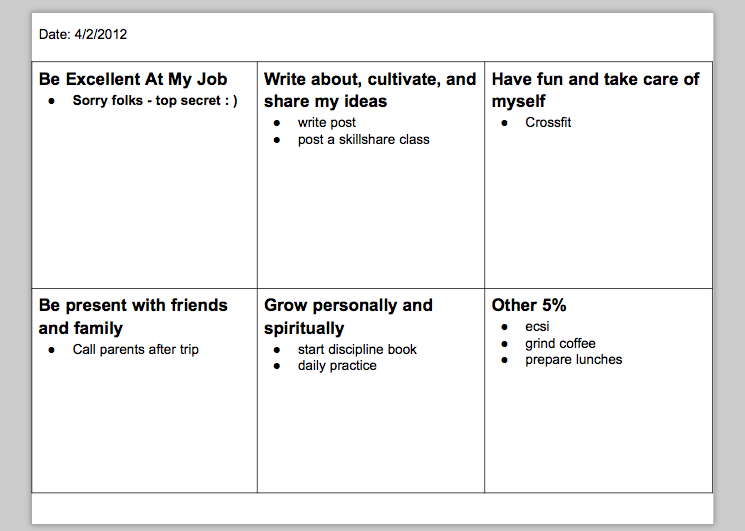
Happy New Year! In time-honoured fashion, the start of the year signifies a time for us to make our new year resolutions.
These can be as massive as writing a book, scaling Mount Everest to something more manageable like losing 10 pounds, exercising every week, or having dinner with your family every fortnight.
Unfortunately, many of us falter along the way. There are just so many distractions, side-tracks and urgent things that need to be done daily, weekly, and monthly.
(Plus, we’re constantly bombarded by the continuous stream of fascinating content on social media — from Facebook posts, Instagram stories, TikTok videos, and YouTube videos, to Tweets and LinkedIn posts.)
Often, these unimportant yet seemingly urgent matters take us away from achieving our lofty and noble goals.
Don’t believe me? Ask yourself this — what resolutions did you make last year and which have you ticked off your list?
I bet that most of you can’t remember what you resolved to do! I certainly can’t!
How then can you manage and keep to your resolutions?
Peter Bregman, a highly popular columnist on Harvard Business Review, provided some useful advice on sticking to your resolution in a HBR Ideacast on “How to Keep Your New Years Resolution”.
The author of 18 Minutes, he shared some useful tips on how we can set better resolutions and see them through in the course of the year. Here are some highlights for you to chew over.
Stick to 5 Major Accomplishments
The first thing to note is that you shouldn’t overdo your lists. Having too many things on your plate will result in you ending up with indigestion or worse — throwing away the half eaten food.
Rather than have a laundry list, focus on only five major accomplishments for the year, and stick to your guns as much as possible to achieve these five items. These items could either be in the professional, personal or social areas of your life.
For my upcoming year (2021), I resolve to achieve the following:
- Master one new social media channel or technique
- Launch at least 2 new courses during the year
- Read at least 2 new books every month (ie 26 or more in total)
- Catch up with at least 2 friends/ associates every month
- Write one new article on a business-related area every week
Create a 6-box “To Do” list
Now that you have agreed on what the five major accomplishments should be, it is time to create a 6 box “To Do List” for keeping new year resolutions.
One of them — the sixth box so to speak — would be the other 5%, ie the lower priority list of items which you should keep away from. These items would be like sugar or candy. They are stuff that are nice to do, but not critical to your personal road map of success.
The remaining 95% should comprise the more important and critical items that you should stick with.
An example of such a list can be seen below:
Courtesy of Life-Long Learner
Two Ways to Overcome Fear of Failure
One of the major stumbling blocks to achieving your goals is what Bregman called the fear of failure. This is usually proportional to the the size of your undertaking.
Often, the larger and more visible your endeavour is, the greater your fear would be. And we do know that fear paralyses us from taking action. It also stops us from finishing what we’ve started.
To overcome this, there are two tricks that Bregman teaches:
#1 Visualise Worst Case Scenario
Visualise what’s the worst thing that could possibly happen.
Would failure result in possible death? Loss of your livelihood? Or perhaps just cause some minor embarrassment to you amongst your friends and family members?
Often, your worst case scenarios are not as bad as you imagine them to be.
#2 Do Smaller Projects First
Start with the smaller projects first. There are often less painful if you manage to screw them up.
Use these as a learning ground to gauge the reactions and outcomes of others. Doing these also helps you to build momentum and gather speed as you tackle loftier projects.
The good thing about starting small is that you can learn and adapt without suffering the consequences of massive failure. After you’ve practiced with the smaller projects, you’ll find out that “Hey, it isn’t that bad after all!”
Over time, you’ll be able to surmount your fear and build your confidence before surmounting those larger audacious projects.
Keep Your List of Resolutions Highly Visible
Now that you’ve done your list, you need to keep your list somewhere highly visible so that you can view it, preferably every day.
This will then serve as a constant reminder of what needs to be done each time, and you can tick them off one by one.
Do a Little Each Day
Do a little every day to build up your respective areas. See if you can work on each area wherever possible rather than attempt to close the gap only towards the end of the year.
Be relentless too in paring away tasks that fall into the other 5% and leave these luxuries for later.
Remember that the only way to eat an elephant is take one bite at a time.
Share Priorities With Your Boss (Or Your Employee/Staff)
But what if you work in a company and have a boss to report to? Or fellow team members that you’re accountable for?
In a work context, it may be useful to share the priorities between employees and bosses. This helps to ensure that there is common understanding on what should and should and should not be done while clarifying intents.
Doing so also reduces the possibilities of last minute work being dumped on you as an employee. Or a boss. While that may sometimes still be inevitable, having this discussion early does help to minimise such ad hoc projects.
Schedule Specific Times for Your Activities
Whatever gets scheduled, gets done.
Schedule specific times and deadlines for doing things. Failing to do so would often result in these items being left out cold.
Wish to go for a run after work every other day? Put that in your calendar!
Working on a book? Include some “writing time” in your calendar. Make sure you’re uninterrupted or distracted during that golden hour.
Got an email that you need to write or respond to (but don’t wish to do so now)? Put that in your calendar!
As part of the process, make it a point to clear your emails/facebook messages/Whatsapps only at specific periods in a day. Maybe you can do so once in the mornings, afternoons and evenings?
At work, find a way to control your own time. Reach an understanding with your boss or staff on what would work best – and stick to it!
Be Truly Present When the Time Comes
Finally, be truly present when the time comes to perform certain specific activities. This can be anything from speaking to a colleague or a customer, or being with your family members.
Put away those smart phones and leave your emails or Whatsapp messages to later.
Where possible (and I’m telling myself this), don’t be enslaved by that 6 by 2 inch screen at the expense of those whom you love and care about.
Are there other strategies which you’d adopt to stick to your resolutions — and improve your personal productivity? I’d love to hear from you.
Peter Bregman (courtesy of WaterStones)


